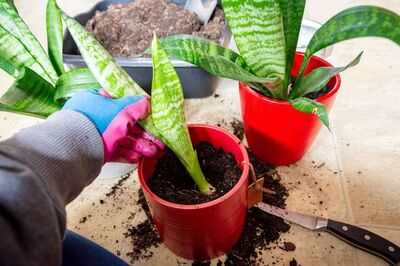
Mould and condensation are persistent problems in many UK homes, especially as the colder, wetter months set in. Whether it's black spots creeping up the bathroom wall or water droplets forming on windows each morning, the effects of excess moisture can be damaging to property and a health risk. Sharing their knowledge about the best houseplants to tackle mould, experts at Gardening Express highlighted: "Mould in the home is caused by excess humidity. Warm rooms, like bathrooms, are at particular risk."
"Using plants to help keep mould at bay is a practical and natural way to control humidity and moisture in your home," the experts added. "How good a plant is at reducing humidity is all to do with its ability to absorb dew, fog and other moisture through its leaves."
Three houseplants that prevent mouldEnglish Ivy
English ivy is an ideal choice for smaller or more humid rooms, especially bathrooms where air tends to stagnate. It's known for its ability to remove airborne mould spores, and it thrives in bright, indirect light and requires regular watering. For best results, water thoroughly and allow the soil to dry slightly between each watering.
While English ivy prefers moderate humidity, it will adapt to normal indoor levels. To boost humidity without risking root rot, place it on a tray of wet pebbles-just be sure it's not sitting in standing water. It's also best kept in a hanging pot or high shelf, not only to enhance air circulation but also to keep it out of reach of pets, as the leaves are toxic.
Peace Lily
The peace lily is more than just an elegant plant with its signature white flowers. These tropical plants excel in high-humidity environments, making them perfect for spaces prone to damp. According to Gardening Express, peace lilies "love the shade and thrive in high humidity, so are the perfect choice for areas prone to mould".
Peace lilies absorb excess moisture through their leaves and tolerate low-light conditions well-some can even grow under artificial lighting. In addition to their moisture-absorbing abilities, peace lilies also help purify the air and are a great option for households with allergy sufferers.
Remember to deadhead spent flowers and gently wipe the leaves to keep the plant healthy and photosynthesising efficiently. Like ivy, they are toxic to pets, so placement is of utmost importance.
Snake Plant
Known as mother-in-law's tongue, the snake plant is one of the most resilient and adaptable houseplants available. This species is particularly effective at tackling condensation and excess moisture, thanks to its thick, upright leaves. It's also exceptionally low-maintenance, only needing watering every one to two weeks.

Snake plants thrive in bright, warm conditions, but will tolerate a range of environments, and their textured leaves not only absorb water but also contribute to cleaner air. According to NASA research, snake plants can filter out common household toxins, making them a powerful all-rounder for indoor wellbeing.
Adding just a few of these plants to your living spaces and bathrooms could make a noticeable difference in moisture levels. The experts at Gardening Express said: "The beauty of this natural solution is that you will notice an improvement while having beautiful plants to enjoy too."
You may also like

India's forest cover up by mere 2.5% in 10 years but 'very dense forest' component grew 22.7%: First ever report on national forest accounting

Vikas Sheel apointed as Chhattisgarh's 13th Chief Secretary

The real stars of the screen - 10 of the best English heritage film and TV locations

Liverpool boss Arne Slot confirms Diogo Jota contract gesture in emotional interview

Mahanadi Water Dispute 'Artificially' Created For Political Optics, Benefiting Lawyers: Odisha Advocate General






